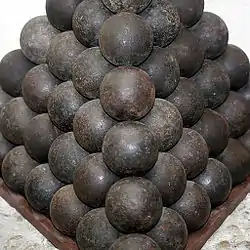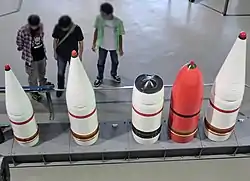砲弾
Japanese


| Kanji in this term | |
|---|---|
| 砲 | 弾 |
| ほう Grade: S |
だん Grade: S |
| on’yomi | |
Etymology
From Middle Chinese 炮彈 (MC pʰˠauH dɑnH, “cannon + shot, shell”).
Noun
砲弾 (hiragana ほうだん, rōmaji hōdan, historical hiragana はうだん)
- (weaponry) a cannon shell:
- a cannonball, a round shot
- 1999 March 27, “タイホーン [Canhorn]”, in Vol.2, Konami:
- 口から砲弾を撃ちだし遠くを攻撃。山での砲撃は強い。
- Kuchi kara hōdan o uchidashi tōku o kōgeki. Yama de no hōgeki wa tsuyoi.
- It attacks from far away by shooting cannonballs out its mouth. It is very effective to deploy on mountains.
- 口から砲弾を撃ちだし遠くを攻撃。山での砲撃は強い。
-
- an artillery shell
- a cannonball, a round shot
This article is issued from Wiktionary. The text is licensed under Creative Commons - Attribution - Sharealike. Additional terms may apply for the media files.